"Dragon Quest formula" sounds good to me. I got to try this someday. It was always that unobtainable game when I was collecting and going to flea markets.
EarthBound Review Rewind
|
|
See PixlBit's Review Policies

On 06/28/2019 at 08:00 AM by Jamie Alston The RPG that wasn’t afraid to get weird. |

Besides the limited inventory system and a couple of minor faults, this is still a fine RPG that fans of the genre should play if they haven’t already.
Remember that silly old trope in teen movies where the nerdy “plain Jane” character magically becomes super attractive just by removing her glasses? It was a bit like that with EarthBound- an RPG that was largely ignored when released on the Super NES in its twilight years. Nintendo’s ill-conceived ad campaign telling the player that “this game stinks” didn’t do it any favors either. The game’s overtly humorous kid-friendly facade was unusual for its time and quickly written off as ugly and boring by all but the most accepting of RPG fans. But thanks to the positive praise in gaming forums years later, it picked up steam and eventually became lauded as one of the best on the Super NES. Much like the bespectacled character in every 90s teen comedy, it was as if EarthBound removed its glasses. Nothing was different about it- just our perception of what was already there.
The game is about a kid named Ness who, after investigating a meteorite crash, learns that an alien invasion by a creature called Giygas is underway. Ness must travel to eight sanctuaries around the world to gather key musical melodies and use them to defeat the invader and his army. Along the way, he is joined by three companions- Paula, Jeff, and Poo. Together they’ll set out on a journey that will take them to the ends of the earth and beyond the stars.
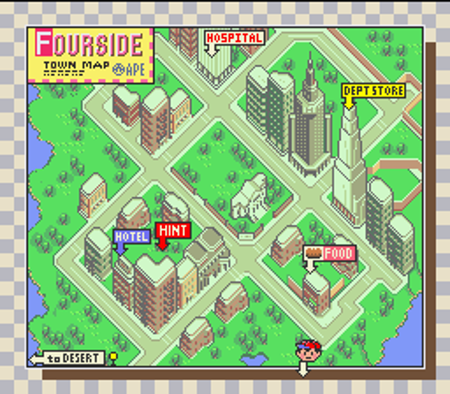
Part of EarthBound’s charm is that it eschewed the high fantasy middle earth aesthetic common in most RPGs, and instead takes place in a modern-day setting. Instead of villages and kingdoms, there are suburban towns and bustling cities (complete with traffic jams too). In place of magic, characters have psychic (PSI) powers. In lieu of imps and dark knights, you’ll do battle with hippies, bears, angry roaches, and a host of other fixtures of [mostly] everyday life that’ll likely make you chuckle a time or two when you see them.
Currency is acquired via Ness’ dad who periodically adds cash to your bank account, which can then be withdrawn from an ATM wherever you happen to be. And your dad (to whom you only converse with over the phone, but never actually see) does a pretty good job at keeping your account stocked well enough for you to afford a moderate number of items and equipment, provided you don’t blow all your cash too quickly.
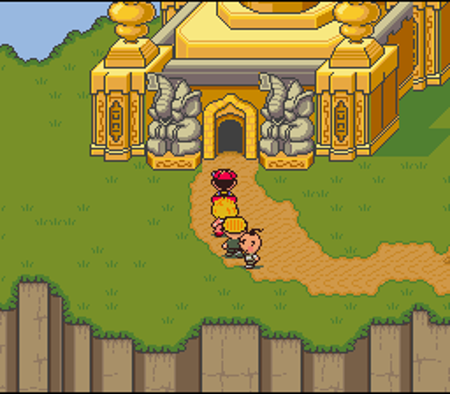
Thoughtful care also went into enemy encounters. Instead of being forced into random battles, enemies appear on the map, allowing you to decide if you want to fight or attempt to evade them. Most notably, once you reach a high enough level, enemies on the map will actually run away from you. If you catch up with them, you automatically win the battle (assuming no other enemies join in before transitioning to the battle screen). Best of all, you still collect experience points, which eliminates the tedium of level-grinding or constantly transitioning into a battle screen when you just want to make it to the next area.
One of the best nuances of the battle system is the rolling hit points counter. It functions similar to a car’s odometer in that when a character takes damage, their hp “rolls” downward gradually instead of an instant deduction. This mechanic allows you to survive deadly attacks that hit in the hundreds for damage- as long as you can end the battle or heal up before the hp counter reaches zero. The rolling hp mechanic is super useful since there are several enemy types that can wreak havoc on your party with residual damage after they’ve been defeated. It’s really too bad that this particular design element didn’t carry over into more RPGs through the years.
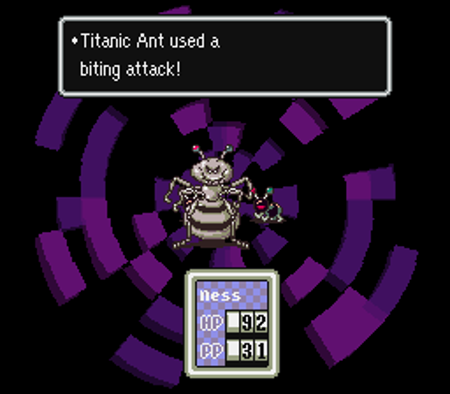
At its core, the battle and menu systems borrow heavily from the early Dragon Quest series, which is both good and bad in key areas. On the positive side, the battles are simple and straightforward, taking place in the first-person viewpoint. Offensive PSI abilities can attack an individual enemy, a row of enemies, or all foes onscreen. Unfortunately, they also copied some of the annoying aspects of Dragon Quest as well. For example, regular attacks don’t always connect. Your party characters seem to miss at the most inopportune times, especially later in the game when you’re fighting enemy types that love to pelt your party with crippling status effects.
The inventory system isn’t great either. Slots quickly fill up since equipable items also take up space in each character’s inventory list. It doesn't help that certain key items (ATM card, phone, etc.) must remain in your inventory in order to perform common tasks you will need to do fairly frequently. It especially becomes irritating when Jeff joins your party since he has character-specific items that- when coupled with the weapons and defensive gear taking up space- makes it seem as if his inventory is maxed out at all times. There were many occasions midway through the game when I really could have used those slots for replenishment items to help balance everyone’s inventory. Instead, I often found myself either juggling items between characters or permanently leaving behind helpful items I wanted to use later.
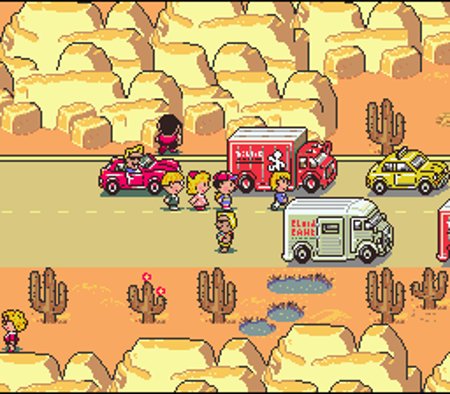
To compensate for the limited carry capacity, you have the ability to store items you want to save for later by calling a delivery service that can come to almost any location. However, this service also has a limited carrying capacity. What’s especially irritating is that you can only give or retrieve up to three items at a time- meaning that you’ll have to place multiple requests, one at a time, which becomes laborious depending on how many items you need at the moment. It adds a cumbersome element that feels unnecessary especially considering that older RPGs like Final Fantasy IV weren’t nearly as limited with its item management.
But even with the aforementioned shortcomings, the game more than makes up for it with its quirky characters and late 20th-century portrayal of Western culture. Many of the towns you’ll visit have bakeries, hospitals, and a department store of some sort. Throughout the adventure you’ll take down an eccentric street gang, fight dirty cops, and befriend a music band with an uncanny resemblance to the Blues Brothers- and things just get more interesting (and downright weird) as you progress further. The game is also full of small neat details that affect your party, such as the need to call Ness’ mom periodically to hear her voice, lest he becomes homesick and distracted in battle. Such gameplay elements were unheard of in RPGs at the time and really helped it to stand out as unique.
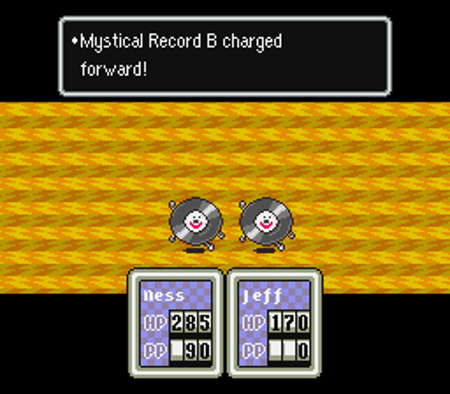
The audio presentation in this game some of the best I’ve heard in an RPG from the 16-bit era. The instrumental and sound effect samples had more of a realistic tone than I was expecting. I really enjoyed the music that plays in Onett (Ness’ hometown) with its easy-going theme that hints of adventure waiting beyond the town’s borders. But the game goes well beyond a few cutesy tracks from one place to the next.
The musical landscape covers a wide spectrum of moods. One minute it’s playfully avoiding copyright infringement of “Johnny B. Goode”; the next moment, ominous tones ebb and flow in the background as you explore a subterranean alien base. Especially near the end of the game does the music make good use of the contrast between the kid-friendly visuals and the bleak doomsday scenario that Ness and crew are trying to prevent. It’s a juxtaposition that works surprisingly well.
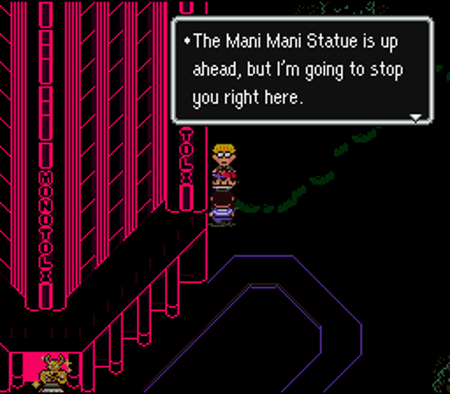
Even with its few blemishes, EarthBound still sticks the landing. The gameplay- while leaning a bit too heavily on the Dragon Quest formula at times- broke the mold of what we came to expect in other RPGs when grinding for experience, fighting random battles, or just adventuring in the world set before us. And since few (if any) RPGs followed in its footsteps by using a rolling HP counter or allowing automatic victories while skipping the battle, it actually helps this game to retain its uniqueness down to this day. If you’re a fan of old school turn-based RPGs and haven’t played this one, you definitely should. Personally, EarthBound is a beautiful game I can appreciate- geeky glasses and all.









Comments